
JOHN REMSEN BISHOP , Ex-Principal of the Walnut Hills High School, at Cincinnati, Ohio, and now Principal of the Eastern High School, Detroit, is conceded to be an educator of more than ordinary ability and learning. His education was thorough, he having graduated from the celebrated Harvard University, after which he took up the profession of teaching. His career as an educator commenced in 1882, when he accepted the position of instructor in Greek in the St. Paul's School, Concord, New Hampshire. This position Mr. Bishop held for one year, after which he became Principal of the Preparatory School in Princeton, New Jersey, remaining there for a period of three years. In 1888 he became instructor in Greek and Latin in the Hughes High School at Cincinnati. For seven years he taught those languages at Old Hughes, and it is needless to say that he met With the greatest success. His ability as a teacher, as well as his executive qualifications were fully recognized in 1895, when the Board of Education of Cincinnati appointed him as Principal of the Walnut Hills High School, which institution had been recently erected. Mr. Bishop continued in that important position for nine Years, and ,resigned in 1904 to accept a position as Principal of one of the High Schools of Detroit, Michigan, in which city he now resides. In June, 1903, he received the. honorary degree of Ph.D. from the University of Cincinriati. His departure from .Cincinnati was considered a great misfortune. 'to the educational advantages of the Queen City, for during his stay in the metropolis of Ohio he has been of incalculable service to the 'educational advancement of Cincinnati. It is hoped that in his new field of usefulness the people of Detroit will appreciate and benefit by his many sterling qualities, not only as an educator, but as a man.
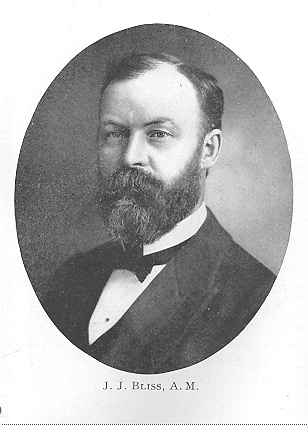
J. J. Bliss, A. M., Superintendent of Public Schools, Bucyrus, Ohio. Among the educators of Ohio few have been more thoroughly devoted to. their profession than has J. J. Bliss, who by teaching sent himself first to Hiram College, then to Oberlin, at which latter place he graduated with the degree of A.B. in the full classical
- 650 -
course in 1881. His next year was spent as. Superintendent of the Schools on Kelley Island. Three months in a private school in Mansfield the following autumn convinced him that the public schools afforded the most satisfactory field for teaching. In January, 1883, he entered the Bucyrus High School, where he .spent the remainder of that year and the two succeeding ones as Principal. In the autumn of 1885 he was called to Crestline in the same county (Crawford) as Superintendent, where he remained ten years, going back to Bucyrus as Superintendent in 1895, where he has since been.
Mr. Bliss has been active in all educational .matters of the county, having taken especial interest in the Ohio Teachers' Reading Circle branch in the county, and in the teachers' institutes. At present he is actively engaged in establishing a Y. M. C. A. and a public library in his city. Of the former he is President, and of the latter a Trustee and Secretary. He is a graduate of the Chautauqua .Literary and Scientific Circle, and of the Prang course in Form Study and Drawing, and holds a State High School life certificate. In 1886 he received the degree of Master of Arts from his Alma Mater, and Was also married on the 24th of June of that year to Ella May Fuhrman, of Bucyrus. One son died' in babyhood, but a son, Marion George, and a daughter, Mary. Mahala, now bless their home.
Mr. Bliss was born on the 16th of May, 1854, in Russell, Geauga County, but was reared on a farm in Bainbridge Township in the same county, where as the oldest of a family of five children he spent a happy boyhood in the educative pursuits and pleasures of a Western Reserve country life. His father was Olney R. Bliss, and his mother Mahala J. McFarland, the parents .of both of whom had come from Berkshire County, Massachusetts, in pioneer times. He had three grand-fathers in the Bliss line, who were Revolutionary soldiers, and two in the Potter line, to which his maternal grandmother belonged. Through the latter line, he is descended from Roger Williams by his daughter Mercy. Mrs. Bliss's paternal grandfather was a soldier under Napoleon I. The Bliss family is descended from Thomas, of Belstone, England, who came to Massachusetts in 1636 and became a freeman in the Plymouth colony in 1645. The mother's family, the McFarlands, were of Scotch ancestry.
By giving his entire time to his profession, by visiting schools in various :parts of the country; by vacation travel, by attending educational conventions, and by diligent study of educational journals and of his ample pedagogical, historical and literary library, as well as: by thorough study Of the actual conditions of his schools, Mr. Bliss has kept himself in the front rank of :practical educators, and aimed to be worthy of the family motto, "Semper sursum."
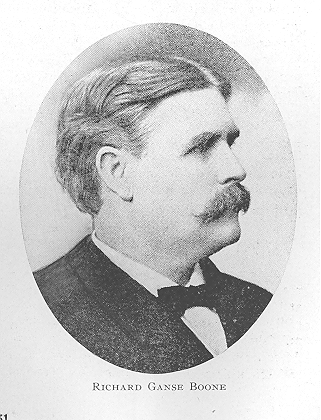
Richard Ganse Boone, From 1899 to 1903 Superintendent of the Public Schools of Cincinnati, Ohio, was born on the 9th of September, 1849, at Spiceland, Indiana. He is of Quaker descent, and received his early schooling at the academy in his native
- 651 -
village. Later, after several years of experience in teaching, he pursued special studies in psychology and educational science in the Johns Hopkins University. He received the degree of A.M., from DePauw University, and that of Ph.D. from Ohio University. Having begun teaching at the early age of seventeen, Dr. Boone, in the course of twenty-five years, has held positions in schools of every grade, from the country district through village and city graded High Schools, normal school, and the University, an experience of inestimable value to a man who has been at the head of institutions for many years.
In 1886, while holding the position as Superintendent of City Schools in Frankfort, Indiana, Dr. Boone received the appointment as Professor of Pedagogics in the Indiana State University, at Bloomington. This University has been known throughout the country for the strength of its courses, the thoroughness of its scholarship, and the care exercised in the selection of its teaching force. Nearly all of its chairs were filled by specialists of reputation in their respective lines—the President of Leland Stanford Jr. University, professors in Harvard and other leading universities have been chosen from among its faculty—at the time when he was called to the University.
Dr. Boone has made an enviable reputation among leading educators of the country, a reputation extending far beyond the limits of his native State. He is well known by his contributions to, educational journals and by his courses of professional lectures in Indiana, Ohio, Michigan, Illinois, Pennsylvania, New York, West Virginia, Arkansas, Kentucky and Texas.
Dr. Boone was called to. Michigan as President of the State Normal College in 1893. He remained there for six years, bringing the institution up to a higher standard of excellence than it had ever before attained. His influence was felt throughout the State in a very forceful way. While thus doing great service to the cause of education as a practical worker, and displaying great interest and activity in the spreading of sound pedagogical ideas in the country, Dr. Boone was too much of a student and scholar to lose sight of the importance of thorough professional learning as the only true basis of successful practice of the profession. Besides steadily pursuing those psychological studies so indispensable to the educator, he felt early drawn toward the historical side of educational knowledge, feeling, like every true scholar, the want of an acquaintance with the work of others, in the past and present, in his own chosen field, for it has been truly said by a world-famous educator : "The science of pedagogy without the history of pedagogy is like a house without a foundation." The history itself is the greatest science. Confining himself in his historical studies at first to the comparatively narrow field of the educational development of a single State, he soon after commenced the preparatory studies for an undertaking of wider scope and greater scientific importance, an account of the original development and actual status of education in this country. From a vast amount Of material largely in a chaotic state, to be found only in public documents and dusty files of many libraries, the author of "Education in the United States" has succeeded in composing a volume which in a very short time has won the highest praise of the profession and the press—the first noteworthy attempt at a general history of education in the United States, an honor to American learning, a work involving much patience and trying labor, and evincing strong powers of judgment and reasoning. The results of his earlier studies ("Education in Indiana") were published at at later date. Dr. Boone was appointed Superintendent of the Cincinnati schools on the 5th of September, 1899, and resigned his position in 1903. Dr. Boone is editor of "Education," published in Boston, one of the oldest and best-known magazines in the United States. After leaving Cincinnati, Dr. Boone became extensively engaged as lecturer on educational and scientific topics.
- 652 -
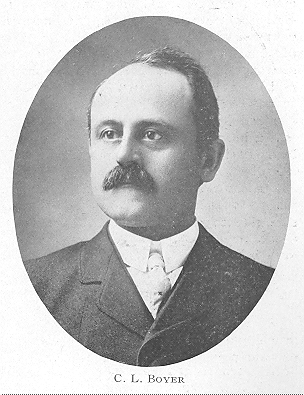
C. L. Boyer, Since 1899 Superintendent of the Public Schools of Circleville, Ohio, has a place among the best-known educators of the State. By his untiring industry and unflinching perseverance, he has worked his way through the various fields of school life to his present position, in which he is serving with marked success. His early life was spent on a farm, where he acquired the habits of industry and of perseverance. At that time there were no eight or ten hour labor laws, but work began at the peep o' day and continued until the last rays of the sun had melted away. Having some natural gifts, he was sent to school at the age of five and at seven gave considerable evidence of becoming a champion speller, an accomplishment that was regarded at that time as a mark of learning. However, it was through this subject that he acquired a taste for knowledge and sought to take advantage of opportunities for advancement. Not the hard work of the harvest field and of haying, nor the labor of following the plow caused him to lay aside study. While the men and horses were resting he would make the fence corner his school-room for the study of Latin and German.
His first experience as a teacher was in 1881, at Pickerington, Ohio, where he taught a special summer school. In the winter of 1881-1882 he was employed to teach the school that had been the nursery of his education. Here he met with such success as led to his being called, the following year, to teach the village school of Waterloo, Ohio. That he succeeded in this school is evident, for one of his pupils was so influenced by his teaching that she became his life partner. But to teach in a rural school was not the goal for which he was striving. At the end of five years' service he resigned his position at Waterloo and entered college, from which he graduated in 1891 with the degree of A.B. After graduating from college, he returned to teaching, taking charge of the schools of Lithopolis, Ohio. In 1893 he was called to Lima College, where he became Professor of Mathematics and Principal of the Normal Department. This position he occupied until 1897, when he resigned to become Superintendent of Schools at Logan, Ohio. In 1899 he was elected to superintend the city schools of Circleville, Ohio.
Mr. Boyer has always been an active member of the Teachers' Association of the State and has lent his influence to the betterment of his profession. His affable manners and keen sense of justice make him a safe and popular school man. His integrity and upright conduct give evidence of a clean Christian character. He is a firm believer in the dignity of labor, and does not hesitate to engage in any honest toil, whether on the farm, in the factory, or in the school-room. Mr. Boyer takes the ground that an education does not lift one above the sphere. of labor, but that it enlarges his capacity for work, widens his influence and enables him to command the forces, that they become factors in his success.
- 653 -
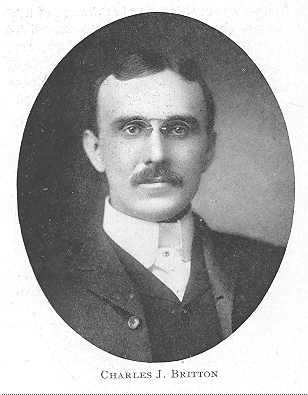
Charles J. Britton, Superintendent of the Public Schools of Kenton, Ohio, is one of the rising young educators in the State of Ohio. He was born on the 3d of July, 1867, near Williamsburg, Ohio. His ancestors were of the strong, virile type of cavaliers who originally settled in Maryland and Virginia, and later, attracted by the romance, mystery and fertility of the Ohio wilderness, came Westward and assisted in its development. His father, B. Britton, though past the four-score mark, is still living in this little village, and can scarcely be said to have retired from the active business duties of life. His mother was Martha J. Boyd, one of the daughters of the pioneer family that came to Ohio in 1823. Mr. Britton's boyhood days were spent on a farm, and year followed year as uneventful to him as to the average country boy. He learned to work, went to school, and after the usual apprenticeship was graduated from the village High School under the control of Byron Williams, a teacher of rare merit and a man of great character. In rapid succession the panorama of his educational life passed. His education was largely received at the National Normal University and the University of Michigan. This work, supplemented by continuous teaching, by persistent study and travel, has made Mr. Britton a very well informed man. He holds life certificates in Ohio and Illinois ; was in the schools at Olney, Illinois, and later became Superintendent of Schools at DeGraff, Ohio, for a period of eight years. From here he went to Gallipolis, Ohio, for three years, and is at present at the head of the schools in the thriving city of Kenton, Ohio. Mr. Britton, through his educational work, is well known among the school men of the country. He is a member of the N. E. A.., many State and local organizations, a Knight Templar, a Methodist in religion and a Republican in politics. He was married to Ada F. Sanders, of Piqua, Ohio, on. the 23d of November, 1892, and is the father of one child, Helen Pauline. The best evidence of work and manhood is found in the testimony of the friends and pupils of a school man, and the people, patrons and pupils of the towns and cities whom Mr. Britton has served testify their appreciation for him and his work in terms of unqualified approval.
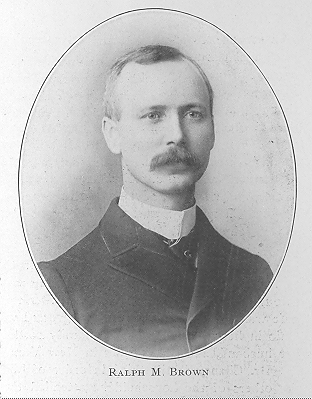
RALPH M. BROWN, Superintendent of the Public Schools of Troy, 'Ohio, was born at' Marseilles, Wyan dotte County, Ohio, on the 17th of April, 1863. He the son of Jacob C. and Alvira (Hull) Brown, natives of Ohio and Pennsylvania, respectively. On his mother's side he is a member of the historic Hull family, his grandfather being a cousin of Commodore Isaac Hull. The grandfather of his father came from that one-time French province of Alsace. Ralph M. Brown, at the early age of six years, went with his parents to Kansas, where his father
- 654 -
took up a homestead, receiving his education in the common schools of Kansas and the Kansas Normal School, of Paola, Kansas. Since returning to Ohio he has attended two summer sessions of the University of Michigan, one of the Ohio Wesleyan University, and one of the Michigan State Normal College. In 1892 he passed successfully the State examination at Columbus, Ohio, and was granted a High School life certificate.
At the age of eighteen years he started in public life as teacher in Washington County, Kansas. Later he taught in Miami County and the village of Spring Hill, that State. In the spring of 1889, Mr. Brown came to Troy, Ohio, to fill a vacancy caused by the resignation of the Principal of the Edwards School. At the close of that term he was elected Principal of the building and the Junior High School, which was established in the fall. This position he filled for ten years, with the exception of one year (1894-1895), when he was associated with his brother as editor of the Oklahoma Daily Times-Journal, in which he is still financially interested. In 1899 he was elected Principal of the High School, which position he filled until his election to the Superintendency in 1902, at a yearly salary of $1,600. His salary has been increased each year since, until he is now receiving $1,800. During the summer of 1903 Mr. Brown taught mathematics in the: summer session of the Michigan State Normal College, Ypsilanti. Michigan. In political belief he is a Republican, and socially he is connected with the various orders of the Masonic fraternity. On the 7th of August, 1901, he was married to Miss Georgia Fox, of Ovid, Michigan, a graduate of the Michigan State Normal College, and for the two years preceding a teacher of the Troy High School. Their home has been made glad by the advent of a little girl, Florence Louise, who arrived on the 3d of December, 1904. His residence is now No. 114 Raper Street, Troy, Ohio.

N. H. Chaney, A.M., Ph.D., In the educational circles in Ohio, Dr. N. H. Chaney has gained prestige, occupying an enviable position in the ranks of the profession in this State. It is a widely acknowledged fact that the most important work to which a
- 655 -
.
man can direct his energies is that of teaching, whether it be from the pulpit, from the lecture platform or from the school-room. Its primary object is ever the same—the development of one's latent powers, that the duties of life may be bravely met and well per. formed. To the labor of instructing the young Dr. Chaney devotes his time; energies and thought, and his labors have had far-reaching effect, not only in the dissemination of the knowledge gleaned from books, but also. in the establishment of principles of growth and of mental concentration, which will have effect upon the life of the student after leaving the school-room. In 1902 he accepted the position of Superintendent of the schools of Youngstown, and already the educational system of this city has felt the stimulus of his efforts, and has been advanced to a higher standard.
Dr. Chaney is a native of Highland County, Ohio, born on the 4th of March, 1856, a son of John A. and Mary C. (Holmes) Chaney. His father was born in Pennsylvania on the 7th of March, 1825 ; the family is of Scotch-Irish lineage. The Doctor's father was but a boy when his parents took up their abode in Highland County, where he was reared to manhood, and then took up farming as a life work, following agricultural pursuits throughout his entire business career. He passed away on the list of April, 1880. His wife was born in New Jersey in 1832, and with her parents came across the mountains to Ohio in her girlhood days, the family settling in Fayette County, Ohio. She still survives her husband, and now resides in New Vienna, Clinton County.
Dr. Chaney is the third in order of birth in a family of four living children, and like the others of the household he attended the common schools of Highland County in his youth. At the age of seventeen he began teaching school, and was thus engaged until twenty years of age, when, desiring to add to the knowledge he had already gained, he entered Wilmington College, in Clinton County, Ohio, from which institution he was graduated with the degree of Bachelor of Arts in 1880; three years later, in the spring of 1883, he received the degree of Master of Arts from his Alma Mater, after three years of advanced critical study of the German language and literature. He then entered upon a careful and extensive study of English literature and speculative philosophy in the Ohio Wesleyan University, which conferred upon him the Master of Arts degree in 1892, for the work which he had done in the former branch, and the Doctor of Philosophy degree in 1893 for his attainments in the latter branch.
Dr. Chaney believes that education is a matter of a life-time, and his extensive reading and investigation are continually broadening a mind whose possessions have already reached the classification of the scholarly. He has studied to a considerable extent in the University of Chicago, and he holds a life State certificate in Ohio. As an educator he has attained distinction as a recognition of his superior ability, and under his guidance several schools of Ohio have made rapid, satisfactory and practical advancement. After completing his first course in Wilmington College, he became Superintendent of the schools of Clarksville, where he remained until 1884. From 1885 until January, 1887, he was Superintendent of the schools of Blanchester, Ohio, and from January until June, 1887, was Principal of the High School at Washington Court House. He was then advanced to the Superintendency of the schools of that city, where he remained until 1898, covering a period of eleven years. He then accepted the Superintendency of the schools of Chillicothe, continuing there until he secured his present position, coming to Youngstown in 1902. He was elected President of the Ohio State Teachers' Association at the session of that body, at Put-in-Bay, June, 1903
- 656 -
Dr. Chaney makes a close and thorough study of his work, its needs, its conditions and its possibilities, and he bases all of his labors upon thoroughly practical methods. He has taken as his motto, "First a man, then a scholar," and he has made it his aim to develop in the pupils character that shall form the basis of upright manhood and womanhood. He believes with Sydney Smith that "the real object of education is to give children resources that will endure as long as life endures ; habits that time will ameliorate, not destroy ; occupation that will render sickness tolerable, solitude pleasant, age venerable, life more dignified and useful, and death less terrible." Dr. Chaney is a fine scholar, a superior teacher, a close organizer and a fair-minded but firm executive. He inspires teachers and pupils with his own zeal and interest in the work, and he makes, as far as possible, a study of each pupil, insisting that his individuality shall be preserved and his latent powers of selfhood shall be developed.
In 1880 Dr. Chaney was united in marriage to Miss Anna Roush, of Sabine, Ohio, and they now have three daughters, Bertha, Opal and Emma. The Doctor gives his political support to the Republican party, and keeps well informed on the great problems affecting the Nation's welfare. Fraternally, he is a Mason, having been raised in the lodge at Clarksville, Ohio, in 1883. The following year he took the chapter degrees in Hillsboro, and in 1884 he also became a Knight Templar in Hillsboro Commandery. He is likewise an Odd Fellow, and a member of Temple Lodge at Washington Court House. He and his wife hold membership in the Methodist Episcopal Church, and he has labored earnestly and effectively for the moral as well as the intellectual development of the race. He realizes that the intellectual and moral natures are so closely allied that it is impossible to instruct the one without in a measure influencing the other, and certainly the best results are accomplished when the work goes hand in hand. He has therefore endeavored to create an atmosphere of justice, of truth and of honor, not only in the school-room, but upon the campus, and the good influence of such a course is immeasurable. That Dr. Chaney is a man of broad intelligence and genuine public spirit, has been shadowed forth between the lines of this review. Strong in his individuality, he never lacks the courage of his convictions—the dominating elements in his individuality being a lively human sympathy and an abiding charity, which, taken in connection with the sterling integrity and honor of his character, have naturally gained for him the respect and confidence of men.
R. P. Clark, Superintendent of the Public" Schools of Ashtabula, Ohio, is a man who has earned an enviable reputation as an educator, and one whose attainments in his line of endeavor are recognized by the leaders in his profession all over the State of Ohio. For the past few years he has occupied the position which he now fills with credit to himself and to the satisfaction of the people in his district. During all his active life he has been associated with the educational advancement of the State, and is thoroughly conversant with all the details of his profession, having occupied every position of trust in the chosen field to which he has devoted his life. He is a man of splendid attainments, a careful student, and one who has the welfare of those under his charge at heart. The success of the schools of Ashtabula has been largely contributed to by the painstaking initiative of Mr. Clark. He resides at Ashtabula, Ohio.

Frank Theodore Cole Was born in Brattleboro, Vermont, on the 22d of June, 1853. He is descended from Thomas Cole, who settled at Salem, Massachusetts, in 1634, through the line that moved
- 657 -
to Boxford and Harvard, Massachusetts, and Westmoreland, New Hampshire, where his father, Theodore Cole, was born on the 19th of May, 1813, and where he grew to manhood.
When Theodore Cole was twenty-two years of age he went to. New Bedford, Massachusetts, and shipped as "green hand" on a whaling ship. In May, 1843, he sailed as master of the ship Parachute, and made three voyages in that capacity, acquiring a competence and retiring from the sea. After his first voyage as master, he married in August, 1845, Livilla, daughter of Captain Wilson, and Lucy (Atherton) Gleason, of Westmoreland, New Hampshire. She was born on the 21st of March, 1818.
In October, 1845, Captain Cole sailed in the ship "Marengo," and in November, 1848, in the ship "Cowper" on a long voyage to the Arctic Ocean. Mrs. Cole accompanied him. They sailed for Cape de Verde, around Cape Horn, to the Sandwich Islands, where he left Mrs. Cole for the summer, and steered direct for Behring Strait, passing Oonalaska in June, He remained one season in the Arctic regions, discovering the Plover Islands on the 15th of July, 1849, although he never claimed title as discoverer. On his return to the Sandwich Islands his wife joined him, and they sailed for Hong Kong, where a month was spent in preparation for another Arctic voyage. On this voyage Mrs. Cole was with him. He sailed through the Japan Sea, stopping at Petropalaska, and into the Arctic, where the cargo was completed, and then they sailed for home, arriving on the 22d of March, 1851. Captain Cole decided to give up the sea, and engaged in merchandising and manufacturing in Brattleboro,. Vermont, where he lived seven years, and where his children were born.
In 1859 the family moved onto a farm in Westminster, Vermont, and in 1867 again moved, to Waverley, Massachusetts, Captain Cole engaging in the produce business in Boston. In 1876 he returned to the old home town of Westmoreland, New Hampshire, where he died on the 2d of July, 1884. During his residence in Westminster he represented that town in the Vermont Legislature, and in 1881-1882 represented Westmoreland in the New Hampshire Legislature. He voted for Fremont in 1856, and thereafter was a. member of the Republican party. Both he and his wife were reared under Universalist influences, but about 1876 they joined the Congregational Church.
Frank Theodore Cole, the oldest child, was educated in the public schools, and prepared for college at Phillips Andover Academy and at Williston Seminary, Easthampton, Massachusetts, graduating from the latter school in June, 1873. He entered Williams College. and graduated with the degree of A.B. in 1877, and from Columbia in 1879 with the degree of LL.B. In December, 1879, he was admitted to the bar in the Second District of New York. He settled in Columbus, Ohio, in the same month, was admitted to the bar of Ohio in February, 188o, and practiced his profession there until the 1st of January, 1887. Two
- 658 -
years of business life followed, when he opened the Columbus Latin School, and in that profession has since been engaged.
During the years of his law practice he was sotnewhat interested in politics, being President of the Garfield and Arthur Glee Club in 1880 and a director of the succeeding clubs of 1884 and 1888, and was a member of the City Committee and of the County Committee from the old Ninth Ward. From 188o to 1882 he was on the Executive Board of the Y. M. C. A., serving as Chairman of the Entertainment Committee.
Sunday School interests have claimed much of his time. For ten years he was Secretary of the Franklin County Sunday School Union; assistant superintendent of the Sunday School of the First Congregational Church some twelve years ; assistant superintendent of the Goodale Sunday School Mission for two years, and first superintendent of the Mayflower Sunday School. When this latter school was organized into a church he withdrew from the First Church and became one of the charter members and a trustee of the new organization, remaining- while his services were needed, and then returning to the mother church.
Mr. Cole has always been interested in athletics, and was one of the founders and twice President of the Columbus Tennis Association, and for some six years past President of the-Columbus Golf Club. He was one of the charter members of the Columbus Whist Club ; was at one time member of the University Club the Monday Club, the Garfield Club, the Columbus Club, and is now a member of the Arlington Country Club.
During the years 1888-1889 he was Secretary of the Disbursement Committee of the centennial celebration of the passage of the ordinance erecting the Northwest Territory, and of the encampment of the Grand Army of the Republic, held that year at Columbus.
In 1886 he published "The Early Genealogies of the Cole Families in America," and has since prepared a partial genealogy of the Gleason family, besides furnishing several biographical articles for the "Old Northwest" genealogical quarterly, of which Publication he is editor. He is a life member of the Ohio Historical and Archaeological Society, and of the "Old Northwest Genealogical Society." Of this latter organization he has been an officer from its organization, and since June, 1903, has been the Secretary.
The Columbus Latin School, which Mr. Cole organized in 1889, was the outgrowth of a school for boys, established in 1888 by Mr. Charles Moore; and taught during the year 1888-1889 by him, with the assistance of his brother, Dr. H. M. W. Moore, M.D: Mr. Moore, deciding to accept a position at Yale, disposed of the equipment and Mr. Cole opened the school on Grant Avenue near Broad Street. He had the assistance of Mr. T. Starr Corey, A.B. in mathematics; of Professor C. R. Von Lybel, Who continued with him nearly eight years, in German, and of other talent in the Junior branches. The next year a partnership was made with Amasa Pratt, A.B., lately Superintendent of the School for the Deaf, and enlarged quarters were secured at No. 441 East Town Street. This partnership continued for two years, at the end of which period Mr. Pratt withdrew. Mr. Abram Pratt, A.B., M. Charles Poulalion, with Mr. Von Sybel, were the assistants. Mr. Frederick B, Ryder, A.B., was secured as assistant, remaining for two years, when he started a rival school. During the next five years the school had the assistance of Misses Carolyn Scott, Mary T. Burdick, A.B., Mary E. Ferrell, H. DeNagy, Marie C. Duby, and Messrs. E. J. Russell, A.B., B. A. Eisenlohr, A.B., C. E. Albright, A.B., Rev. H. Hoffman, Joseph F. Marsten, A.B., and John Lewis, removing on the 1st of January, 1895, to No. 527 East Broad Street, and in September, 1898, to the corner of Broad and Seventeenth Streets. During these ten years there were in attendance at the school the following, pupils: Frank M. Anderson, John Guy Atkinson, Wm. Auld, George N. Barvere, Chester and Percy Briggs, John Beebe, Lawrence Bright, Guy Baldwin, Samuel D. Blake, Guy and Max Butler, Percy Bissell, Louis
- 659 -
Boyha, Ruth Brown, Lawrence Cummings, Campbell M. Chittenden, Rea Chenoweth, Leroy Converse, Dean Crawford, Andrew Campbell, Frank and Albert Drake, Robert P. Duncan, Dean S. Davis, Otto Darst, L. R. Day, Charles H. Evans, Charles Firestone, William M. Frisbie, Wade Fornoff, Adam Foverman, Cecil Fanning ; Reynolds, Jesse and Helen Guerin; Melbury Greene, Meldrum and Eugene Gray, William H. and Edward A. Gorman, Edward Galvin, Ambos Harris, George G. Henry, Thomas Hallwood, Louis Haywood, Walter Herr, Jay B. Hofman, Herman Hubbard, Allen and Harold Hayden, Louis Hosher, Paul Hardy, Clarence Hills, Carl G. Jahn, Agnes Jeffrey, William Joyce, Bertram G. Jones, E. Bernard Jones, Charles Johnston, Yamanaka Kosoburo, Lincoln and Marie Faye Kilbourne, Turney Keys, Philemon Karshner, John Lilley, Frank and Paul Lindenberg, Charles Lee, Paul Loving, H. R. M. Landis, George Longstreth, Herbert Linthwaite ; James, John and Jessie March ; Baldwin McComb, William P. Markeson, William E. McConnell, Clinton S. Main, Ewing Martin, William Merkle, Brent E. McCoy, Bruce McCracken, Harry and Ann Miller, Louis Miller, Perin Monypeny ; Norton, Rex and Corrine Monsarrat, F. B. Moore, _____ McMann, Joseph F. Marsten, J. Mark Naughton, James Nelson, William Nicholas, Charles Outhwaite, Edward T. Powell, Frank Potter, Selden Pratt, William C. Park, John F. Putnam, Edward and Jacob Reinhard, Carl M. Ruhlen, Karl Ricketts, Andrews and Hayes Rogers, Archibald and Starling Rodgers, Richter, Austin Randall, Frederick N. Sinks, Otto H. Stutson, Edward Strittmater, Fred Sager, Edwin R. Sharp, Jr., Percy Stafford, Stephen Sheldon, Paulding F. Sellers, Herbert and Mary Leuter, Fred Thomas, Allen G.. and Tod Thurman, Harry and Ellison Waite, Percy Waddel, Oscar Wolfram, ______ Walcott, George F. Whittemore, Eugenia Gray Watson, Maurice Eugene Zapp. Of these, eighty entered college ; thirty-six have graduated, or are now under-graduates.
In 1899 Mr. Cole joined with Professor Abram Brown, long Principal of the Central High School in Columbus, and with Miss Alice Gladden, establishing "The University School of Columbus," becoming Secretary, while Mr. Brown was Principal. The school was located at No. 106 East Broad Street. At the end of the first year Miss Gladden withdrew. The school moved to No. 187 East Broad Street into a building especially altered to suit its requirements. Mr. Brown returned to High School work in the fall of 1901, and Mr. Cole became Principal, and still continues in that position. The school has had the assistance of Messrs. E. E. Rich, B.S., John S. Norris, B.S., C. P. Fairbanks, B.S., M. Guibert de la Mache, Ernest Pierce, A. B., F. D. Kunkel, A.B., Cyrus Scott, and Misses Margaret D. Saxton and Mary Wirth. Those in attendance, aside from any mentioned above, were: William Andrews, Mildred Alberry, Orville T. Adams, Thomas L. Beckwith, Paul Butterworth, William L. Bell, Howard W. Burger, Lucian Brown, Walter E. Bock, Alfred Blake, John Bennett, E. Alfred Carpenter, Elizabeth Cole, Willis W. Case, Jr., Clarence G. Craig, Theodore Cole, Ralph B. Campbell, William Carparis, Winfield S. Clark, William A. Carlisle, Farfield Crowley, Margaret S. Dobbie, Ray and Wilbur Dunham, Platt F. Downerd, Edward M. Doelker, William D. Duffy, William H. Dickenson, Jr., Nelson F. Evans, George Follett, Paul Hamilton, Jr., Robert Burnwell Fuller, C. Barney Goodspeed, Walter J. Guilbert, Baldwin J. Gwynne, Thomas J. G. Gifford, Lyman R. Haller, Emil W. Hosher, Groves B. Higgins, Lillian C. Howard, Lawrence B. Holmes, Lewis A. Huston, Harold S. Hall-wood, Helen Hall, Harry Heyl, William A. Hutchins, Lawrence C. Hornbrook, Neal Has-brook, Francis J. Judge, Helen D. Johnston, Katrina and James Kilbourne, W. M. Kennedy, Robert Little, Edward Lauman, Herbert M. Lang, Malcolm McNaughten, Harry Monett, Henry and Huston Miller, Robert K. McAllister, Walter Blake McKinney, D. Edward McDanald, William A. McAfee, Robert A. McConnell, Carter G. Monsarrat, William M. Newson, Edward and David Neil, Marion Parker, Claren E. Pfeifer, William Powell, Lea
- 660 -
D. Phillips, Robert S. Platt, Charles A. Pech, Frederick R. Palmer, John M. Plaished, Elmer J. Reinhard, Paul F. Ross, Katharine and Louise Robinson, Florence Rodgers-, E. K. Stewart, Jr., John William Strickler, Carl, G. Sater, Robert E. Sheldon, Jr.; Louis. Ray Sutton, Edgar J. Sayers, George R. Smith, Herbert S. Thomas, Guy Walker, Percy R. Williams, William and Randolph Warner, William O. Wolfe, Herbert C. Whysall, Barry. Wall. Twenty-nine of them have entered college, and thirty-seven are still preparatory students. The students of this school have entered Harvard, Yale, Princeton, Dartmouth, Amherst, Williams, Middlebury, Massachusetts Institute of Technology, Cornell, Columbia, Smith, Wellesley, Wells, Pennsylvania State, Alfred, Western Reserve, Case, Wooster, Marietta, Ohio Wesleyan, Ohio State and Kenyon ; also the Starling Medical, the Ohio Medical University, University of Pennsylvania, Jefferson Medical and the Cincinnati Law School. The work done has been of a high grade, and the teaching force of the best of cultivated and educated men and women. It has done a good work also. in the influence it has had through private teaching by its Faculty outside of the regular school hours, to many boys and girls whose names do not appear on the above lists.
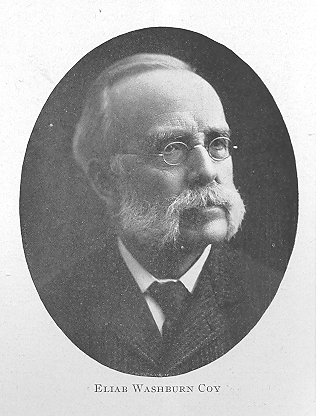
Eliab Washburn Coy, Principal of Hughes High School at Cincinnati, Ohio, is recognized among the foremost educators of the State of Ohio, where he has devoted the principal part of his life in the interests of education. He was born on the 6th of December, 1832, in the State of Maine, from whose rugged shores some of the greatest men in the history of this country have emanated. Mr. Coy received a careful and thorough education and is a: graduate from the famous Brown's University, where in the year of 1858 he received the honorary title of A.M. Later, in the year of 1886, the University of Princeton conferred on him the degree of Doctor of Philosophy. Immediately after his graduation from Brown's University he accepted the position of Superintendent of Schools at Peoria, Illinois. While occupying his position, in his spare time he devoted his attention to the study of law, was admitted to the bar; and in the years of 1865 to 1868 he practiced his profession. But the profession of teaching called him with irresistible force, and in the latter year he returned to Peoria High School in the capacity of Principal. Later he was Principal of the High School Department of the State Normal University, at Normal, Illinois, for two and a half years, and for three years he was editor of the educational journal, "Illinois Teacher." In 1873, Dr. Coy went to Cincinnati, to accept the position of Principal of Hughes High. School. For thirty-two years Dr. Coy has occupied this position, and the record made by him for continuous occupancy of this office is not duplicated by, any other educator in the State of Ohio, and in all probabilities not by any other man in this country. He was married in 1863 to Genal Harrington, and is the father of
- 661 -
three daughters. Dr. Coy was President of the National Council of Educators, and is. a member of the Ohio. State Teachers' Association. He has often furnished articles on educational subjects, and is the author of "First Lessons in Latin," a work which has been recognized by the authorities and has been used for practical educational purposes in many schools.
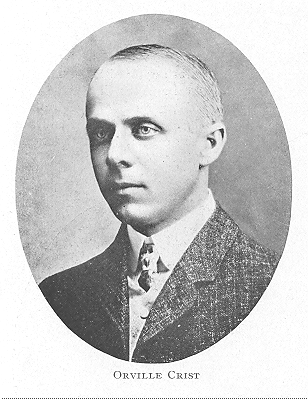
Orville Crist, Superintendent of the Public. Schools of Tippecanoe City, Ohio, is a man well known among the educators of the State; He was born on a farm near Xenia, Ohio, on the 14th of March, 1870. His early education was obtained in the district schools of Greene and Clarke Counties. In the fall of 1887 he entered the academy of Wittenberg College, at Springfield, Ohio, where he remained through his preparatory course and Freshman year. After teaching for two' years in the district schools of Clarke County, he returned to college and graduated June, 1896. In the fall of the same year Mr. Crist became Principal of the High School at Tippecanoe City, Ohio, and held that position till he was elected to the Superintendency in 1903.
Charles L. Cronebaugh, Superintendent of the Public Schools of Massillon, Ohio, was born on the 5th of May, 1864, in Salem Township, Tuscarawas County, Ohio, and was raised on a farm. He is the son of Charles and Elizabeth Cronebaugh, both of whom emigrated to this country at an early age. The father was a native of Rhenish Bavaria, and the mother a Prussian. Mr. Cronebaugh received his early education in the district schools of his home county ; later he attended Buchtel College, at Akron, Ohio ; the National Normal University, at Lebanon, Ohio, from which institution 'of learning he graduated with the degree of Bachelor of Science, and the Ohio State University, at Columbus. He started into public life at the age of nineteen years as a teacher. Prior to that time, however, he had worked on the farm, in the mines and on the railroad, thereby earning sufficient money to enter college. 'Later, while teaching, he continued his work at college for a period of seven years. Mr. Cronebaugh's experiences as teacher are varied and extensive. He possesses all the natural qualities that are bound to make a man successful in everything he undertakes. He taught for three years in the country schools, for seven years in Port Washington, one year in the grammar school, six years as Principal of those schools, one year as Principal of the Dennison High School, three years as Principal of the New Philadelphia High School, and six years as Superintendent of the public schools of Cambridge, Ohio. He resigned from this position in 1904, to accept the Superintendency of the public schools of Massillon, Ohio. In political belief, Superintendent Cronebaugh is a steadfast Republican. He is a member of the Knights Templar, and belongs to the National Educational Association, the State Teachers' Association, the Eastern Ohio Teachers' Association, in which body he is Chair-
- 662 -
man of the Executive Committee at the present writing. On the 29th of June, T899, Mr. Cronebaugh was united in marriage to Miss Catherine McLean, by which union he is the father of one child, Robert Everett McLean Cronebaugh. He is a member of the Presbyterian Church, and has an attractive residence located at No. 24 South East Street, Massillon, Ohio.

H. H. Cully, Superintendent of the Public Schools at Glenville, Ohio, was born and reared upon a farm in Sugar Creek Township, Wayne County, Ohio., on the 3d of June, 1861. He attended the common district school until he was sixteen years of age. He then entered the village High School at Dalton, where he prepared for teaching and for college, alternating five months in school in the winter time with seven months' hard work upon the farm. In August, 1882, he entered the Senior Preparatory Department of Mt. Union College, from which college he was graduated in the classical course in 1887. He taught school in the common district schools from four to five months of each year that 'he was in college, thereby earning every dollar of his collegiate expenses, except the money which was expended the first term, that was earned by hauling ties and bridge timbers with his father's team, upon the Wheeling & Lake Erie Railroad, which was built in 1880-1881, and passing near his home. Prior to graduating from college he was elected Principal of the Dalton (Ohio) schools, where he had previously prepared for college. After three years of service he was elected Superintendent of the schools at Burton, Geauga County, where he remained for five years, and was then elected Superintendent of schools at Glenville, the largest and wealthiest suburb of Cleveland, stretching along the banks of Lake Erie to the northeast of the city. Prior to the annexation of the Second Ward to Cleveland last September, this suburb had a population of about eight thousand people. Under the new municipal code, it was made a city. A new High School building has just been completed at a total cost of nearly $75,000 for site and building. For the amount of money expended, it is admitted to be one of the best High School buildings in the State.
Superintendent H. H. Cully is President of the County Board of Teachers' Examiners. In 1903-1904 he was President of the Northeastern Ohio Teachers' Association. For three years past he has been identified with the Wooster (Ohio) University Summer School, where he has had charge of the Departments of Pedagogy and Superintendency. He has numerous calls to address various educational organizations, as well as many civic and church organizations.
Mr. Cully was married to Miss Ora M. Harper, of Dalton, Ohio, on the 31st of December, 1891. They own a very pleasant home at No. 318 North Doan Street. They have no children.
- 663 -
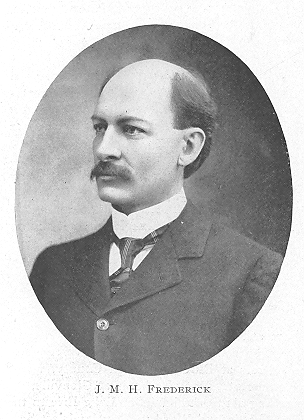
J. M. H. Frederick, Was born on a farm four miles west of Akron, Ohio, on the 19th of September, 1863 the day of the Battle of Chickamauga, the fiercest conflict of the Civil War. When he was three years old, his family moved to their present homestead in Maple Valley, just outside the city of Akron. His parentage on his father's side is German, and the subject of this sketch is of the seventh generation in this country. On the mother's side his lineage is English and Scotch-Irish, and in this branch he is of the sixth generation in this country. His mother's maiden name was Ellen Viers. Her ancestors are said to have come from France with William of Normandy and to have found lodgment in the north of England and south of Scotland. His great-grandparents on both sides were pioneers in Ohio. One of them, Dorsey W. Viers, was the first white child born in Jefferson County, on the site of the present Court House at Steubenville.
As a boy, Mr. Frederick went to school in a "little white schoolhouse" for seven years. In speaking of this experience, he says he believes he accomplished more in two terms in a poorly graded school than in those seven years of district school.
At the age of seventeen he entered the preparatory department of Hiram College, under President B. A. Hinsdale, and spent five years at this institution. At the beginning of his last year here he was offered the position of instructor in either Greek or Elocution. Having taken a course in the summer school of the National School of Elocution and Oratory, he accepted the latter position. His work in this class was eminently successful, as its membership steadily increased from the beginning.
The next year he went to Amherst College, from which he graduated in 1886 with the degree, of A.B. President Julius H. Seelye was then President. Mr. Frederick prizes his contact with President Seelye and President Hinsdale, counting it among the richest compensations of his college course.
Mr. Frederick takes a keen interest in political affairs. He is a liberal Republican in his party affiliation. In 1892 he compiled his "National Party Platforms," which has run through two large editions. There are few politicians and statesmen who are without copies of this work. In religion, while a member of the Disciple Church, he is free in thought and tolerant of other beliefs. In philosophy he is an idealist and an optimist.
On leaving college, it was Mr. Frederick's purpose and ambition to teach, but almost immediately he was drawn into journalism. For many years he held positions on editorial staffs, particularly on the Cleveland Leader, the Akron Telegram, and the Akron Beacon. During this time he wrote special articles for metropolitan newspapers and magazines.
In 1895 the Lakewood Superintendency came to him, practically unsolicited. Elected
- 664 -
at a low salary, his advances have been rapid, until he now receives $2,500 per year, the highest salary paid in a town of its size in Ohio.
He has served as a member of the County Teachers' Institute Committee of Cuyahoga County, and as Secretary and President of the same. He has also been President of the County Teachers' Association and Treasurer of the Northeastern Ohio Teachers' Association. In 1901 he was chosen as Ohio's director for the National Educational Association by that body at the Detroit meeting. The next year he represented his State on the Nominating Committee of this organization, and at the St. Louis meeting in 1904 was elected Vice President of the Association.
He has been prominently mentioned for the Superintendency of large cities, but feels that he still has a work to do in Lakewood. He has steadily refused to consider the position of Teachers' Examiner for Cuyahoga County, repeatedly exerting his influence in behalf of one of his associates, who was seeking the position—a pleasing evidence of one of the prominent traits of his character.
Cuyahoga County is particularly fortunate in having an able set of men as leaders in all matters educational, and Mr. Frederick has been one of the chief promoters in bringing about a happy state of friendly fellowship among them, while his helpful suggestions and genuine friendliness for the younger men in the profession have inspired not a few of them to higher and better things.
As a member of the County Superintendents' Round Table and the Cleveland Schoolmasters' Club, he has done much to mould the educational thought and method of his part of the State.
Mr. Frederick has two daughters, Mildred and Mary, of whom he is justly proud. He considers Mrs. Frederick the best and truest woman on earth. As he gives to his mother credit largely for his habits, so he attributes to his wife much of the credit for his success. When the fight has been thickest she has ever been at his side to assist and cheer on.. She is very devoted to her home, but of late years she has found time to assist the cause of the elevation and improvement of woman. She is now serving her third term as Secretary of Cleveland Sorosis. She has been also a department Chairman of this society, and has represented it in city and State Federation meetings.
Mr. Frederick is a Mason, having taken all the York Rite degrees and all the Scottish Rite degrees up to and including the thirty-second. He is High Priest in Bahurim Council of the Scottish Rite. He is a member of Al Koran Temple of the Mystic Shrine ; also a Knight of Pythias. In college he joined the Delta Upsilon fraternity.
(H. A. Redfield, Nottingham, O.)
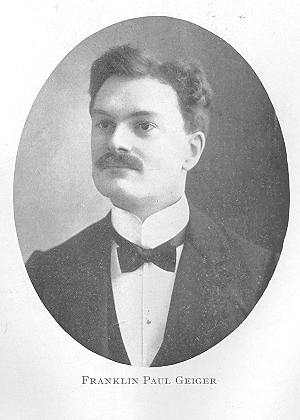
Franklin Paul Geiger, A successful educator, the present Superintendent of the Canal Dover Public Schools, was born at Malvern, Carroll County, Ohio, in 1870. He is the son of Mr. and Mrs. John J. Geiger, and his boyhood was spent upon his father's farm. He attended the district schools
- 665 -
of the neighborhood and later the Malvern High School. Following this, he taught school, for a number of years, in the rural districts, and in 1889 entered Mt. Union College, at Alliance, Ohio, graduating in the normal course in 1892; in the commercial course with the degree of R.C.S. in 1894; he also graduated in the classical course the same year with the degree of A.B. Not only did he graduate, but won double honors in classes. In the military department at college, young Geiger took high rank, serving as Captain of cadets, the highest promotion possible. On leaving college he was Principal of the High School at Carrollton, Ohio; later a teacher in Lancaster (Ohio) High Schools; then coming o the Principalship of fhe Canal Dover High School, and after five years' efficient service, the Board of Education unanimously promoted him to. the Superintendency, which position he still holds, to the universal satisfaction of the Board and the patrons.
Mr. Geiger is a broad-minded, progressive educator, possessing wonderful ability, good judgment, ripe scholarship and a personality that leaves its impression upon every department of the schools. He is a close student of pedagogy, active in the Ohio Teachers' Reading Circle, and all teachers' organizations. He is a member and Chairman of the Executive Committee of the Eastern Ohio Teachers' Association, the Ohio State Teachers' Association, the National Educational Association, and is frequently on the program for an address at the meetings of these different ass0ciations. In 1899 the State Board of Examiners granted him a common school life certificate, and in 1901 he captured a High School life certificate. He is a young man with a high purpose and a determination to win, and a bright and successful future is before him.. While generally absorbed in his school w0rk, Professor Geiger finds time to devote to other matters. He is President of the City B0ard of Examiners and devotes much time to profitable reading and study. In fraternal matters he is a Knight Templar, a K. of P., and a Son of Hur. He was married on the 17th of June, 1896, to Miss Eleeta V. McConkey, oldest daughter of Dr. and Mrs. William J. McConkey, of Canton, Ohio. They have two children, Wendell Wellingon and Hazel Rowena.
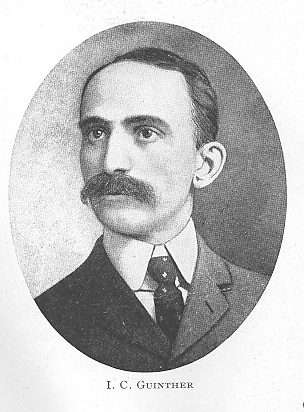
I. C. Guinther, Superintendent of the Public Schools at Galion, Ohio, is an educator of large experience. He was born in Whetstone Township, Crawford County, Ohio, and received his early education in the public schools of Tully and Whetstone Townships. By diligent study he acquired enough knowledge to be able to start : his career as a teacher at the age of eighteen years, when he was tendered a position in the district schools at Winchester. Later he taught in the schools of Plains, Pleasant View, Hill Grove and Pleasant Hill, and in the graded schools at Nevada, Galena, Utica and Galion, Ohio. During all this time, Mr. Guinther never neglected his books. Always being anxious to add o his knowledge, he entered N. W. O. S. U., from which institution he graduated in 1883, receiving the degrees of B.S. and A.M. Mr. Guinther has also received all the grades of certificates ever
- 666 -
issued by the State of Ohio. He has had experience in teaching in all grades of scho0l work, and in tuoring in college, as well as in conducting normal sessions and instructing in Teachers' Institutes. In 1892 Mr. Guinther accepted the position of Principal of the Galion High School, and four years later he was elected Superintendent of the public schools of that city. His record in that place is an enviable one, and his services have been of incalculable value to the students who have come under his directions. Mr. Guinther lives with his family in a pleasant home at Galion, Ohio.

J. M. Hamilton, Superintendent of the Public Schools of Lebanon, Ohio, one of the educators of the State whose name undoubtedly will come for-ward with prominence in the future, was born in Nicholas County, Virginia, in the year of 1862. He received a careful education in his early youth, and is a graduate from the National Normal University at Lebanon, with the degree of B. A. Mr. Hamilton has had a wide experience in every grade of school work. He was Principal of the schools at Liberty Hill, Texas; was a member of the Faculty of the National Normal University for two years, and has been connected with the public schools of Lebanon for a period of ten years, four of which as Principal of the High School, and six in the capacity of Superintendent of Schools. He is the holder of a State Teachers' Certificate, and is President of the Southwestern Ohio Teachers' Association and an active member of the National Educational Association. In church work Mr. Hamilton takes an active and keen interest, and he has made his name identified with all movements for the spiritual welfare of his people. A Mason in high standing, he is well and favorably known among the organizations of that fraternity. Mr. Hamilton is recognized as a thorough and conscientious teacher, and one who does everything in his power to advance the interests of the schools of Lebanon, Ohio. Superintendent Hamilton is a married matt, and resides with his wife and one child in Lebanon, Ohio.
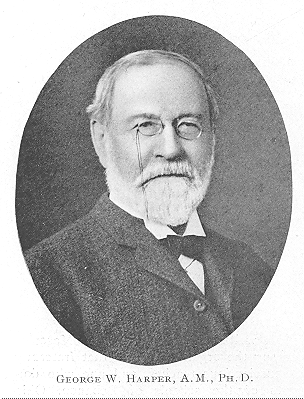
George W. Harper, A.M., Ph.D., Was born on the 21st of August, 1832, in Franklin, Warren County, Ohio, of Quaker stock. The family moved to Cincinnati in 1843, where he assisted his father during the next four years in the grocery and commission business. The training received during this period proved to be of great value during his subsequent career. In 1847 he entered the public schools, was two years in the Central High School, from which he passed to the Woodward College, from which he graduated in 1853, taking the valedicory honor. He intended to pursue the study of law, but through the personal influence of his old. teacher, Dr. Joseph Ray, he was induced to accept temporarily a position as teacher in
- 667 -
Woodward High School, where he continued to teach for forty-seven years, the last thirty-five being Principal of the school, which position he resigned on the 23d of June, 1900. In 1869 he was granted leave of absence by the Board, and spent four months traveling in Europe, during which tour he made a careful study of the school systems and methods in Great Britain and on the Continent. The observations then made were of great value to him, not only in his regular school work, but in the papers he has read and the discussions in which he has engaged in teachers' institutes and conventions.
Mr. Harper is best known by reason of his work and publications on geology. He has made eight exploring expeditions in the South, and one as far west as Utah and the Yellowstone, carefully studying the botany, natural history, and especially the geology of those regions. The results of these trips have been published in pamphlet form. His catalogue of the silurian fossils, containing over seven hundred species, is accepted by all geologists. He has published three catalogues of fresh-water and land shells, the last a second edition, with descriptions, and another containing all the species of bivalves of the Mississippi drainage. One of his last publications is entitled "A Description of our Common Rocks." For over twenty years Mr. Harper was assistant editor of the journal of the Cincinnati Natural History Society. He has been elected President of the society, once in 1885 and again in 1904, which position he now holds. He was for thirty-five years President of the Board of Trustees of the Cincinnati College of Medicine and Surgery. In September, 1873, he was requested by the trustees of the McMicken funds to organize the Cincinnati University. In compliance with this request, a provisional corps of teachers was appointed, and in October following, classes were formed in mathematics, chemistry, physics, Latin, Greek, French and German, the courses beginning where the High School instruction left off. These classes were continued during the year, from 2 to 5 p. m., in the Woodward building. The following year a permanent organization was effected. Mr.. Harper is now Treasurer of the Teachers' Aid and Annuity Association, a Trustee of the Ohio Humane Society, a member of the Board of Education, and also of the Union Board of High Schools, where, owing to his long connection with the public schools, he is well fitted to render valuable service.. In 1885 he became the local observer of meteorology for the Smithsonian Institution. His rain records have been very valuable to the city 'in determining the capacity of the sewer system. In 1861 Mr. Harper had conferred upon him the honorary degree of Master of Arts by the Denison University, and later on Doctor of Physics by Princeton. Mr. Harper became a member of Trinity M. E. Church at the age of fifteen ; at seventeen he was a teacher in the Sabbath School ; at twenty-one was a class leader and trustee, and at twenty-five was elected Superintendent of the Sunday School. Some years later
- 668 -
he transferred his membership to Asbury M. E. Church, near Woodward High School, his chosen field of work, and though he is nearing his seventy-third birthday, is still active in his Christian work, as Superintendent of the. Sunday School and in other departments of the church.
On the 8th of July, 1858, he was united in marriage to Charity Ann, daughter of Friend and Evaline Durrell. Two sons and three daughters were born to them, of whom one daughter, Mrs. Frederick H. Turner, and two sons, E. Ambler Harper, Engineer of Kansas City, and George D. Harper, a prominent attorney of Cincinnati, still survive.
On Mr. Harper's retirement from the school with which he had been so closely identified for forty-seven years, his old pupils gave him a reception, presented him with a handsome loving cup and other reminders of their love and esteem, and a large album, signed by several hundred who were present and containing the cards of many others then living at a distance. The following is the closing paragraph of a series of resolutions, handsomely engraved, in the album :
TO
GEORGE W. HARPER
His pupils inscribe this title of a
GOOD TEACHER.
"For forty-seven years he has been a teacher in the Cincinnati Woodward High School, and for thirty-five years its Principal. Thus he has had to do with fifty classes of pupils. Upward of 2,300 have graduated during this time, and some twelve thousand others have taken partial courses under him. As a man of faith in God, a gentleman, an efficient instructor, a firm disciplinarian, and yet a good friend, during all these years, he holds to-day the love and respect of these thousands, who have been his scholars, now embracing all ages, from youths in their teens to men and women of three-score years, of all avocations ; and residents, not only of Cincinnati, but of every State in the Union, and of every country on the globe, and to-day, the date of his retirement from his position at the head of this High School, they assemble in the hall of the dear old school, to take him by the hand, to thank him for the past, to wish him God-speed for the remaining years and tasks of earthly life, and to express their assurance that at its end the divine verdict will be 'Well done, good and faithful servant."
"In testimony whereto, witness their autographs herewith."
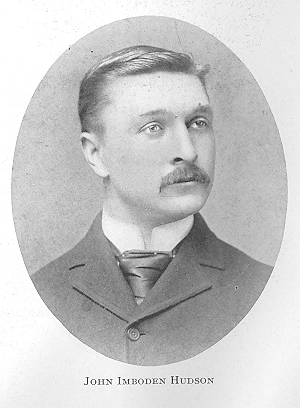
John Imboden Hudson, Superintendent of the Public Schools of Portsmouth, Ohio, was born at Staunton, Augusta County, Virginia, on the 17th of April, 1863. He received his education in the common schools of that city, and was graduated from the High School in 1880. He
- 669 -
entered the Virginia Military Institute at Lexington, Virginia, in September, 1881, and remained there four years,. graduating on the 4th of July, 1885, as Senior Captain of the corps of cadets, and ranking as "No. 3 distinguished" in a class of twenty-five. He then took service with the Maysville & Big Sandy Railroad, now the Chesapeake & Ohio, as an assistant civil engineer, and rose to the position of resident engineer. In 1887 he was appointed resident engineer on the Ohio & Northwestern Railroad, under Colonel John D. Letcher as chief engineer, and later was resident and division engineer on the Roanoke & Southern Railroad. From 1890 to 1893 he taught civil engineering and military tactics at the Ohio Military Institute at College Hill, Ohio, and was with the Kentucky Training School for the next three years in a similar position. He entered the Portsmouth High School as Principal in September, 1896, and held that position until April, 1901, when he was chosen Superintendent to succeed Dr. Thomas Vickers. He was re-elected for 1902, 1903 and 1904. He was appointed city civil engineer in May, 1899, serving until the 3d of January, 1900, when he resigned, after having- completed several miles of street paving, sanitary and other sewers. He was a member of the Flood Defense Commission, which established the present system of dikes and pumping stations as a protection from high water, and was one of the consulting engineers during the construction. He has received the degrees of B.S. and C.E., and also has been a member of the City Board of School Examiners for six years, and is serving his third term 0n that Board. He was married to Miss Elizabeth Doty, daughter of Theodore Doty, on the 3d of September, 1891, and six children have been the result of this marriage. As Superintendent of the Portsmouth schools, he is active, energetic and progressive, and has managed the schools with great efficiency. His efforts during the past three years have placed the public schools of Portsmouth on a plane with those of any city in the State of Ohio.
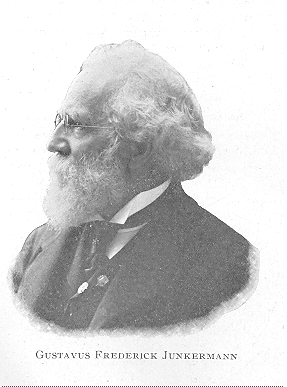
Gustavus Frederick Junkermann, The venerable ex-Superintendent of Music in the public schools of Cincinnati, Ohio, was born on the 8th of December, 1830, at Bielefeld, Westphalia, Germany. He is the scion of a prominent family of that province, his father having been connected with the government. Mr. Junkermann received a very thorough education in the classic schools of his home. Being a youth of exceptional spirit and high ideals, he became involved in the revolutionary movement that spread all over Europe in 1848 and filled the minds of the liberty-loving people with dreams of a European republic. But these dreams were scattered when the reactionary elements became vicarious, and the best blood of the country was ruthlessly sacrificed for the cause of liberty. The activity of Gustavus F. Junkermann in that struggle made him a marked man, and with many others he was captured and condemned o be shot. However, he was more fortunate than others. Through the assistance of true and
- 670 -
daring friends, he managed to escape the night previous to the hour of his execution, and embarked for England. On board of the vessel that carried him from his native land he read a detailed report of his own execution. After many years had passed, through the influence of his father his pardon was obtained from Emperor William, but he never went back to his native land to live, but made several visits to his former home. In Germany he was prepared for the profession of an architect, and when he came to the United States it was but natural for him to trv to embark upon that profession, but he found no occasion to do so. His first work in this country was the arduous labor of pitching hides in a tannery, and later he was employed as a bricklayer. When he came to Cincinnati, shortly after his arrival in the new world, he was engaged as a teacher of German in the Jewish schools, and later in the public schools, and from this time on Mr. Junkermann has played an important part in the history of education of the Queen City. He soon mastered the English language, and his proficiency became so great that he was given a position as a teacher of English in the public schools, and in subsequent years he held the offices of Principal of the Vine Street and Camp Washing-ton Schools. Having received a thorough musical education in Germany, he became closely identified. with the musical interests of Cincinnati soon after his arrival. in that city, and he was the first musician there who started a complete orchestra. He also played in the orchestra of the old National Theater. After he had remained for a number of years in Cincinnati, Mr. Junkermann went to St. Louis, where he followed the musical profession, and from St. Louis started for Memphis. Here he became engaged in business, as well as teaching, but he was so outspoken in his sympathies for the negroes that his business was ruined, and he was compelled to leave, going to New Orleans, where he resumed his musical profession. In that city he played in the French opera. Returning- to Memphis, he found that it was impossible for him to earn enough to sustain his family, so he came back to Cincinnati, leaving his family in Memphis. Immediately before the breaking out of the terrible yellow fever scourge which visited Memphis in the early '70's, Mr. Junkermann was able to send for his family, and thus they escaped a terrible danger. Again becoming connected with the public schools. of Cincinnati, Mr. Junkermann, in 1879, was made Superintendent of Music in the public schools, and he held this position until 'g00. During this time Mr. Junkermann has been of incalculable value to the schools of this city, and has done much towards the development of the musical instinct of the people of the Queen City. For a number of years he was director of the teachers' orchestra, a musical organization of great merit. He retired in 1900, after a long and useful career. As a token of their esteem, the teachers and ex-pupils of the public schools arranged -a testimonial concert for his benefit, given in Music Hall, with tremendous success. Mr. Junkermann has been married twice, and is the father of seven children by his first wife, three of whom are living. His second wife bore him four children, one of whom survives. G. S. Junkermann, M.D., D.D.S., Dean of the Cincinnati College of Dental Surgery, is his son.

Franklin H. Kendall, Superintendent of Schools of Painesville, Ohio, was born in Steubenville, Ohio, on the 15th of January, 1862. He received his elementary education in the Steubenville. public schools, from which he graduated at the age of fifteen. After spending five years in the newspaper business he entered the Ohio Wesleyan University, receiving the A.B. degree in 1887. In September of the same year he entered upon his chosen work of teaching in the Marionville Collegiate Institute, of Marionville, Missouri, and at the close of that year was elected Principal of the Institute. This he resigned to, accept the Principalship of the
- 671 -
Second Ward School of his native city, Steubenville. Here he remained for three years, acting as Principal of the night schools, in addition to his regular work for one year, when he was elected to a position in the High School of that city, from which he resigned to accept the Principalship of the Painsville High School. This position he held for eleven years, in which period the school enrollment was more than doubled. In 1902 he was advanced to the Superintendency of the Painesville Public Schools, which position he now holds. For six years he has been a member of the Lake County Board of School Examiners, and for three years President' of the Board of Trustees of the Painesville City Library.

R. J. Kiefer, Superintendent of the Public Schools at Upper Sandusky was born at Lykens, Crawford County, Ohio, on the 19th day of April, 1871. His parents were of German extraction. Peter H. Kiefer, the father of the subject of this sketch, was born at Wiesbaden, Germany, in 1842. Having been left a widow, with six children, the mother decided to emigrate to America. The oldest son of the family was sent to America in advance on a prospective tour. Glowing reports were sent back, and the next year the widow and family started for their new home. This was in the year 1849. After a trip of forty days on a sailing vessel they landed at New York, and immediately started for Ohio. Their final destination was the southern part of Seneca County, which was to be their future home.
Peter H. Kiefer grew to manhood, a carpenter -by trade. During the Civil War he responded to the call for volunteers, and, joining the Fifty-fifth O. V. I., saw extensive service and marched with the army of Sherman on the memorable expedition to the sea. After the war he returned to Crawford County and pursued his trade.
In 1870 Peter H. Kiefer was married to Miss Sarah Feighner, who was born in Stark County, Ohio. This family came to Stark County from Pennsylvania, to which place they had come from the State of New York. They were from German ancestry, having settled in the State of New York in early
- 672 -
colonial times. After marriage the parents of Mr. Kiefer purchased a farm in Lykens Township, on which they live at the present time.
During his early childhood R. J. Kiefer attended the district school known as the Frog-pond District. Having a mile and a half to walk, he nevertheless attended very regularly, never missing but one and one-half days, until he was sixteen years of age. At this age he was granted a teacher's certificate to teach in the schools of Crawford County. He then taught school in the winters and spent his summers at the Ohio Northern University, situated at Ada, Ohio, where he completed the scientific course of study in 1893. Mr. Kiefer also did surveying on railroad construction work, and while filling the capacity of assistant resident engineer at Attica, Ohio, for the Columbus & Sandusky Short Line he was offered the position of Principal in the High School at Attica, Ohio. This position did not offer as remunerative a salary as did the work on the railroad, but judging that it would offer better opportunities for advancement, it was accepted. At the close of the first year's work, Mr. Kiefer resigned to accept the position of Principal of the Clyde High School. Here he remained for the two following years. He was offered the position for a third year, but resigned to accept the Superintendency of the Attica schools, a position clearly in the line of promotion. The work of Mr. Kiefer met with uniform approval. While there he did much to raise materially the standard of work and secure for the school a high reputation. While at Attica, Mr. Kiefer pursued a course of study at Heidelberg University, situated at Tiffin, Ohio, going to Tiffin on Saturdays to meet his professors and to receive instruction from them. He here completed the classical course of study with the class of 1902. Mr. Kiefer holds both grades of life certificates in the State of Ohio, his High School certificate having been granted in 1897 at the June examination.
In June, 1895, Mr. Kiefer was united in marriage with Miss Ida Sanford, of Attica, Ohio, an estimable and cultured lady, with whom he had become acquainted while at Attica as Principal of the High School. After their marriage they began housekeeping at Clyde, Ohio. Mrs. Kiefer was a teacher in the Attica schools prior to her marriage. She was a graduate of the High School at the same place. Her work in the school-room was very satisfactory, as is evidenced by the fact that she was retained in the same position for seven years. To this union there have been born four children. Mr. and Mrs. Kiefer are domestic in their habits, and enjoy the comforts and pleasures of home life.
After eight years' service at Attica and an offer for the succeeding year Mr. Kiefer informed the Board that he felt that he owed it to himself to seek fields of labor more remunerative and more in line with his abilities as a teacher. His resignation was accepted with reluctance. Mr. Kiefer was elected to the Superintendency at Upper Sandusky, Ohio, at a salary of $1,200. He was chosen from a field of sixty applicants to this position at the age of thirty-two. His work here has been uniformly pleasant and agreeable, and gives satisfaction to all. He has just recently been re-elected to the position at a very substantial increase of salary.
Mr. Kiefer is an active member of the National Educational Association, also of the Ohio State Teachers' Association, the Ohio State Academy of Science, and is always found at the meetings of the local teachers' associations, in which he takes an active part. He is a staunch Christian and a member of the Knights of Pythias and Free and Accepted Masons.

Charles A. Krout, Superintendent of the Public Schools of Tiffin, Ohio, is a men well and favorably known among the educators of the State of Ohio. Mr. Krout was born on the 12th of March, 1862, in Morrow County, Ohio, and is the son of Jacob and Sarah (Rule) Krout, who were
- 673 -
born in Maryland and moved to Ohio in 1858. His father was a carpenter, and reared a family of six sons and three daughters. He died on the 24th of September, 1903, in his eightieth year. The mother of Superintendent Krout still survives. Mr. Krout spent his youth in the village of North Woodbury, M orrow County, where he also obtained his early education. After completing a course of study in the village schools, he went .to Keokuk County, Iowa, and taught school for one year, after which he returned to Ohio and graduated from the Chesterville High School, the father of the noted Dr. Gunsaulus, President of the Board of Education, signing his diploma. After his graduation Mr. Krout taught school in Morrow Countiy until 1883, when he matriculated as a Freshman in Wittenberg College, at Springfield, graduating from this well-known institution in 1887 with the degree of A.B., receiving the degree of A.M., in 1890. Since leaving college he has been engaged in teaching continuously. Three brothers and a sister have also been prominent in school work. He superintended the village schools of New Burlington until 1890, when he became Principal of the Tiffin High School, serving in this position until 1900, when he was promoted to the Superintendency of the city schools. Mr. Krout received his State life certificate in 1894, and spent the summer of that year at Harvard. University, doing special work in physics.
On the 25th of June, 1895, he was married to Mrs. Eva E. Hartmann, and, accompanied by Mrs. Krout, spent the summer in Europe. Two sons have been the issue of this union, John Allen and Charles Vincent. Mrs. Krout had been a successful teacher in the Tiffin High School. Her father, J. T. Bacher, now in his eightieth year, receives her care. Mr. Krout is a member of the English Lutheran Church, and for several years has been Treasurer of the Council and Superintendent of the Sabbath School, while Mrs. Krout belongs to the First Reformed Church. Mr. Krout is a Past Master of the Tiffin Masonic Lodge and a member of DeMolay Command ery, K. of P., and of the Junior Order United American Mechanics. He takes an active part in all school association meetings and civic affairs.
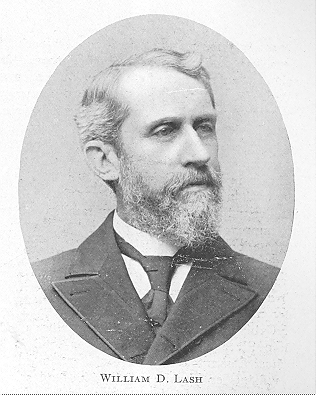
William D. Lash, Superintendent of the Public Schools of Zanesville, Ohio, one of the best known educators of the Buckeye State, enjoys the distinction of having been connected with the schools of his city for more than a generation. Under his tutorship many have been educated who now hold honorable and responsible positions. Mr. Lash first saw the light of day on the 24th of July, 1846. He was born and raised on a farm near Athens, Athens County, Ohio. His father, Jacob Lash, was a native and an early pioneer of the State of
- 674 -